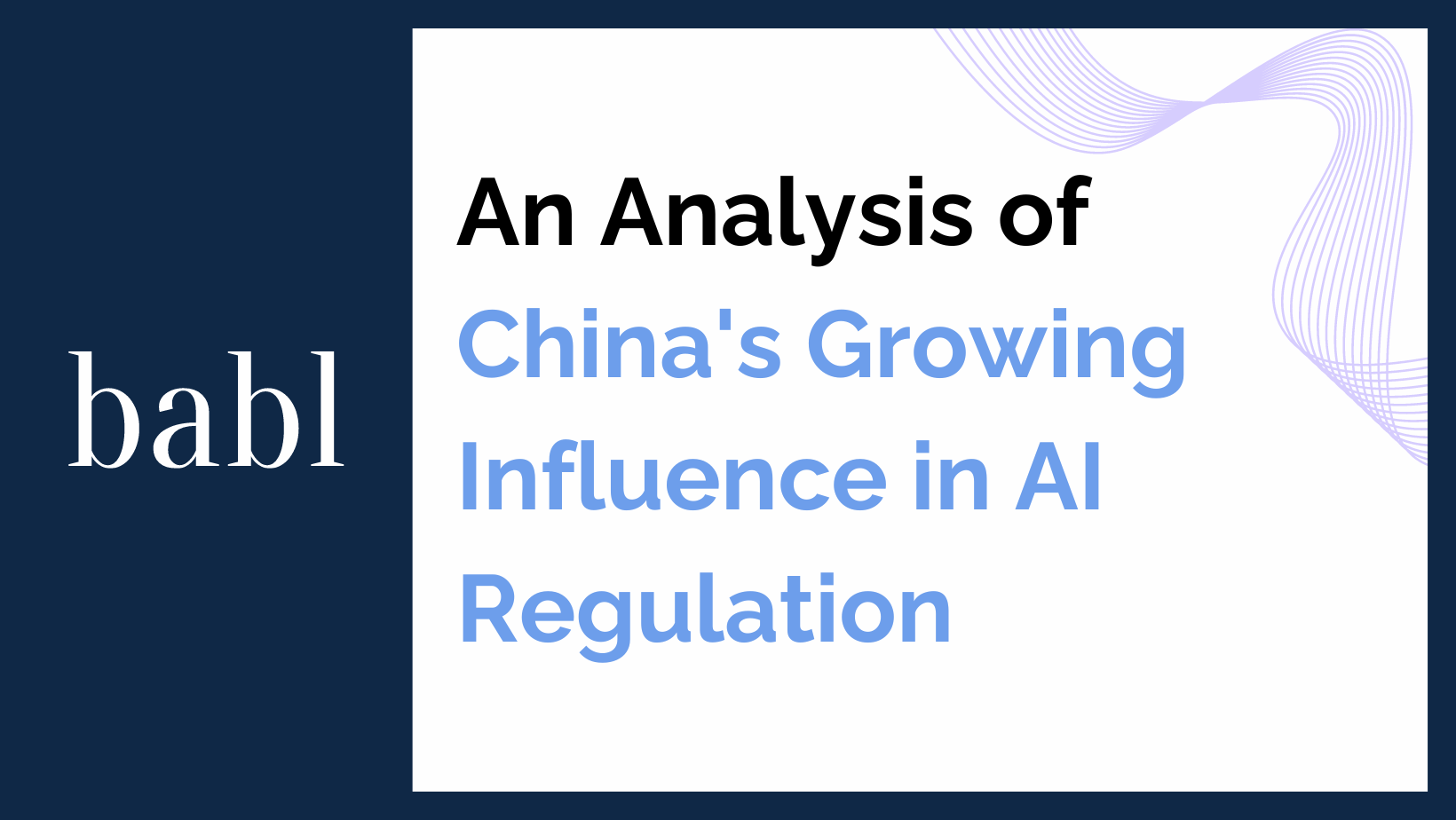UPDATE — JULY 2025: China continues advancing its AI governance framework with a fast-evolving mix of national standards, labeling requirements, and sector-specific rules. As of July 2025, recent milestones include the upcoming enforcement of AI-generated content labeling rules on September 1, the 2023 Generative AI Measures, and an $81 billion AI industry underpinning its global ambitions. While no joint U.S.-China regulatory agreement has materialized, China’s influence in global AI standard-setting continues to grow.
ORIGINAL BLOG POST:
An Analysis of China’s Growing Influence in AI Regulation
While the United States and the European Union pursue distinct paths in AI regulation, China is looking to become a global leader in AI innovation by remaining steadfast in its commitment to shaping the AI landscape, both at home and abroad. Just last month, China’s Ministry of Industry and Information Technology released draft guidelines aimed at standardizing the AI industry. According to Reuters, these guidelines outline ambitious plans to establish over 50 national and industry-wide standards for AI by 2026, with China aspiring to contribute to the formation of more than 20 international AI standards within the same timeframe.
Massive AI Market Growth Fuels Regulatory Ambitions
Analysts valued China’s robust AI market at $23.196 billion in 2021 and project it will soar to $154.638 billion by 2030. China’s recent approval of a series of large language models (LLMs) and enterprise applications for commercial use under its new regulatory framework for generative AI underscores its dedication to advancing technological efficiency within its borders.
2023: A Landmark Year for AI Oversight in China
China’s regulatory efforts gained significant momentum in 2023, as regulators introduced several landmark regulations and initiatives. In January, China enacted the Deep Synthesis Provisions, aimed at enhancing oversight of deep synthesis technologies. These provisions establish stringent rules governing the creation, labeling, and dissemination of deepfake content, setting a precedent for global AI regulation. Regulators introduced the Interim Measures for Generative AI Service Management in May. It prioritizes the safe development and application of generative AI while emphasizing adherence to core values, intellectual property rights, and user privacy.
Expanded Oversight: Licensing, Security, and Data Restrictions
Government entities and tech giants like Baidu, Huawei Technologies, and Alibaba Group Holding spearheaded the creation and implementation of a national standard for LLMs. Additionally, the Administrative Measures for Generative AI Services, would take effect a month later. Regulators unveiled these measures to safeguard user information and ensure compliance. The National Information Security Standardization Committee introduced security for firms offering generative AI services while including a blacklist prohibiting firms from using certain sources to train AI models. At the 3rd Belt and Road Forum for International Cooperation, President Xi Jinping unveiled the Global AI Governance Initiative, calling for the establishment of a comprehensive testing and assessment system for AI. This initiative underscores China’s commitment to promoting AI governance while advocating for a people-centered approach to AI adoption.
Local Governance Models: Shanghai and Shenzhen Lead the Way
Preceding these developments, China introduced the Internet Information Service Algorithmic Recommendation Management Provisions in 2022, akin to the EU’s Digital Services Act, to target monopolistic behaviors by online platforms and uphold ethical standards in AI-based recommendation systems. Furthermore, in September, regulatory frameworks such as the Shanghai Regulations and the Shenzhen AI Regulation were introduced. The Shanghai Regulations, which was enacted, focuses on industry promotion and innovation. They introduce a graded management system and sandbox supervision to foster AI development while maintaining ethical standards. These regulations offer flexibility to encourage innovation while ensuring compliance with industry standards. The government passed the Shenzhen AI Regulation, which aims to stimulate AI adoption by governmental organizations. It adopts a risk-management approach, allowing low-risk AI products and services to undergo testing and trials without strict regulatory oversight. By emphasizing ethics and risk assessment, Shenzhen sets a precedent for responsible AI governance.
Looking ahead to 2024, China’s collaboration with the United States on AI safety could mark a significant milestone in AI regulation. As China continues to set new standards for AI, organizations worldwide must remain vigilant and adaptable to evolving regulatory landscapes. Quality auditing and news monitoring are essential tools for navigating these complexities.
Need Help?
If you’re concerned or have questions about how to navigate AI regulations, don’t hesitate to reach out to BABL AI. Their Audit Experts can offer valuable insight, and ensure you’re informed and compliant.





